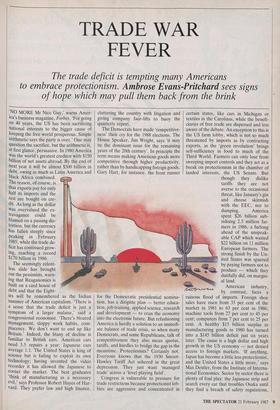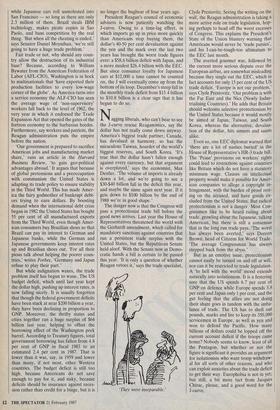TRADE WAR FEVER
The trade deficit is tempting many Americans of hope which may pull them back from the brink
The seemingly relent- less slide has brought out the pessimists, warn- ing that Reaganomics is built on a card house of debt and that the Eight- ies will be remembered as the Indian summer of American capitalism. 'There is a sense that the trade deficit is just a symptom of a larger malaise,' said a congressional economist. 'There's bloated management, sloppy work habits, com- placency. We don't want to end up like Britain.' Indeed, the litany of decline is familiar to British ears. American cars need 3.5 repairs a year: Japanese cars average 1.1. The United States is king of science but is failing to exploit its own technology; having invented the video recorder it has allowed the Japanese to corner the market. The best graduates `think of manufacturing as a necessary evil,' says Professor Robert Hayes of Har- vard. They prefer law and high finance, cluttering the country with litigation and giving company face-lifts to buoy the quarterly report.
The Democrats have made 'competitive- ness' their cry for the 1988 elections. The House Speaker, Jim Wright, says 'it may be the dominant issue for the remaining years of the 20th century'. In principle the term means making American goods more competitive through higher productivity, rather than by handicapping foreign goods. Gary Hart, for instance, the front runner tor the Democratic presidential nomina- tion, has a dirigiste plan — better educa- tion, job training, applied science, research and development — to coax the economy into the electronic future. But refashioning America is hardly a solution to an immedi- ate balance of trade crisis, so when many Democrats, and some Republicans, talk of competitiveness they also mean quotas, tariffs, and hurdles to bridge the gap in the meantime. Protectionists? Certainly not. Everyone knows that the 1930 Smoot- Hawley Tariff Act ushered in the great depression. They just want 'managed trade' across a 'level playing field'.
Congress is vulnerable to pressure for trade restrictions because protectionist lob- bies are aggressive and concentrated in certain states, like cars in Michigan or textiles in the Carolinas, while the benefi- ciaries of free trade are dispersed and less aware of the debate. An exception to this is the US farm lobby, which is not so much threatened by imports as by contracting exports, as the 'green revolution' brings self-sufficiency in food to much of the Third World. Farmers can only lose from sweeping import controls and they act as a break on protectionism in the chamber of landed interests, the US Senate. But though they dislike tariffs they are not averse to the occasional threat, like January's gin and cheese skirmish with the EEC, nor to dumping. America spent $26 billion sub- sidising 2.5 million far- mers in 1986, a furlong ahead of the unspeak- able CAP which wasted $22 billion on 11 million European farmers. The strong finish by the Un- ited States was spurred by paying farmers not to produce — which they dutifully did, on margin- al land.
American industry, by contrast, faces a ruinous flood of imports. Foreign shoe sales have risen from 33 per cent of the market in 1981 to 63 per cent in 1986; machine tools from 27 per cent to 45 per cent; computers from 7 per cent to 25 per cent. A healthy $13 billion surplus in manufacturing goods in 1980 has turned into a $145 billion deficit just six years later. The cause is a high dollar and high growth in the US economy — not denied access to foreign markets. 'If anything, Japan has become a little less protectionist, and the United States a little more,' says Max Destler, from the Institute of Interna- tional Economics. Sector by sector there is plenty of foul play: the Japanese strip and search every car that troubles Osaka until they find a breach of safety regulations, while Japanese cars roll unmolested into San Francisco — so long as there are only 2.3 million of them. Brazil steals IBM technology, makes pirate copies in Sao Paolo, and bans competition by the real thing. 'But when all the cheating is ended,' says Senator Daniel Moynihan, 'we're still going to have a huge trade problem.'
Fair trade or not, why should any coun- try allow the destruction of its industrial base? Because, according to William Bywater from the American Federation of Labor (AFL-CIO), Washington is in hock to multinationals that 'have exported their production facilities to every low-wage corner of the globe'. As America turns into a service economy the ALF-CIO has seen the average wage of 'non-supervisory' workers fall back to the level of 1962, the very year in which it endorsed the Trade Expansion Act that opened the gates of the fortress economy to the barbarian hordes. Furthermore, say workers and patriots, the Reagan administration puts the empire before the nation.
`Our government is prepared to sacrifice American jobs and manufacturing-market share,' runs an article in the Harvard Business Review, `to gain geo-political advantages abroad.' It argues that because of global pretensions and a preoccupation with communism the United States is adapting its trade policy to ensure stability in the Third World. This has made Amer- ica the fairy godmother of bankrupt debt- ors trying to earn dollars. By boosting demand when the international debt crisis began in 1982 the United States has bought 55 per cent of all manufactured exports from the Third World, even though Amer- ican consumers buy Brazilian shoes so that Brazil can pay its interest to German and Japanese banks, while the German and Japanese governments keep interest rates up and Brazilian shoes out. 'For all their pious talk about helping the poorer coun- tries,' writes Forbes, 'Germany and Japan refuse to play their part.'
But while indignation waxes, the trade problem itself has begun to wane. The US budget deficit, which until last year kept the dollar high, pushing up interest rates, is now falling nicely. It is usually forgotten that though the federal government deficits have been stuck at near $200 billion a year, they have been declining in proportion to GNP. Moreover, the thrifty states and cities together ran a huge surplus of $64 billion last year, helping to offset the borrowing effect of the Washington pork barrel. According to Treasury figures, total government borrowing has fallen from 4.8 per cent of GNP in fiscal 1983 to an estimated 2.4 per cent in 1987. That is lower than it was, say, in 1959 and lower than many, if not most, other Western countries. The budget deficit is still too high, because Americans do not save enough to pay for it, and risky, because deficits should be insurance against reces- sion rather than credit for a binge, but it is no longer the bugbear of four years ago.
President Reagan's council of economic advisers is now patiently watching the J-curve. Owing to a time-lag effect, in which imports go up in price more quickly than Americans stop buying them, the dollar's 40-50 per cent devaluation against the yen and the mark over the last two years has brought the worst trade figures ever: a $58.6 billion deficit with Japan, and a more modest $26.4 billion with the EEC. But since consumer loyalty for Japanese cars at $12,000 a time cannot be counted on, the J will eventually come up from the bottom of its loop. December's steep fall in the monthly trade deficit from $15.4 billion to $10.8 billion is a clear sign that it has begun to do so.
Nagging liberals, who can't bear to see the J-curve rescue Reaganomics, say the dollar has not really come down anyway. America's biggest trade partner, Canada, has devalued in harmony, so has the miraculous Taiwan, hoarder of the world's biggest reserves, and South Korea. 'It's true that the dollar hasn't fallen enough against every currency, but that argument is overplayed,' says the economist, Max Destler. 'The volume of imports is already down a lot, and we're going to see a $30-$40 billion fall in the deficit this year, and maybe the same again next year. If it gets down to $100 billion by the end of 1988 we're in good shape.'
The danger now is that the Congress will pass a protectionist trade bill before the good news arrives. Last year the House of Representatives threatened the world with the Gerhardt amendment, which called for mandatory sanctions against countries that run a persistent trade surplus with the United States, but the Republican Senate held aloof. With the Senate now in Demo- cratic hands a bill is certain to be passed this year. 'It is only a question of whether Reagan vetoes it,' says the trade specialist, They were inseparable.' Clyde Prestovitz. Seeing the writing on the wall, the Reagan administration is taking a more active role on trade legislation, hop- ing perhaps to head off the worst excesses of Congress. This explains the President's State of the Union blustery warning that Americans would never be 'trade patsies', and his I-can-be-tough-too ultimatum to the EEC last month.
The averted gourmet war, followed by the current more serious dispute over the European airbus, are somewhat misleading because they single out the EEC, which in fact accounts for only 15 per cent of the US trade deficit. 'Europe is not our problem,' says Clyde Prestovitz. 'Our problem is with the Far East and the Nics (Newly Indus- trialising Countries).' He adds that Britain should welcome selective protectionism by the United States because it would mostly be aimed at Japan, Taiwan, and South Korea, whereas the alternative, devalua- tion of the dollar, hits sinners and saints alike.
Even so, one EEC diplomat warned that `there are a lot of nasties buried' in the House of Representative's HR-3 trade bill. The 'Pease' provisions on workers' rights could lead to restrictions against countries like Britain which do not have a statutory minimum wage. Clauses on intellectual property would make it possible for Amer- ican companies to allege a copyright in- fringement, with the burden of proof rest- ing on the accused, and have goods ex- cluded from the United States. But radical protectionism is not a danger. Most Con- gressmen like to be heard railing about trade, growling about the Japanese, talking American, but there is still a consensus that in the long run trade pays. 'The worst has always been averted,' says Doreen Brown, head of Citizens for World Trade. `The average Congressman has always stepped back from the abyss.'
But as an emotive issue, protectionism cannot easily be turned on and off at will, nor can it be restricted to trade legislation. A 'to hell with the world' mood extends naturally into isolationism. It is a festering sore that the US spends 6.7 per cent of GNP on defence while Europe spends 3.8 per cent and Japan only 1 per cent, and the gut feeling that the allies are not doing their• share goes in tandem with the imba- lance of trade. The US has to shell out pounds, marks and lire to keep its 350,000 servicemen in Europe, as well as yen and won to defend the Pacific. How many billions of dollars could be lopped off the current account deficit if the troops came home? Nobody seems to know, least of all the Pentagon, but whether or not the figure is significant it provides an argument for isolationists who want troop withdraw- al for all sorts of other reasons, and who can exploit anxieties about the trade deficit to get their way. Europhobia is not in yet; but still, a bit more tact from Jacques Chirac, please, and a good word for the J-curve.



















































 Previous page
Previous page